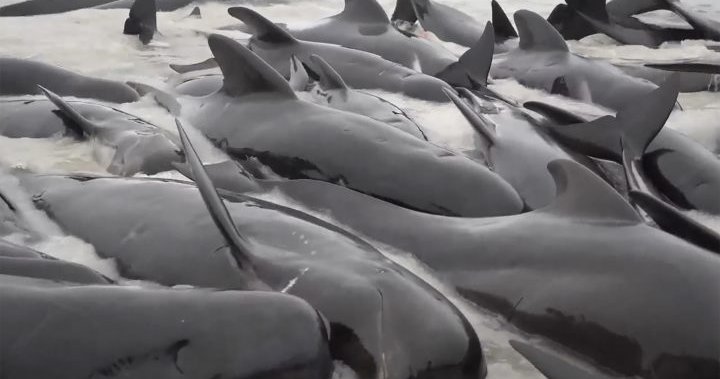Volunteers worked frantically on a second day Wednesday to save dozens of pilot whales that have stranded themselves on a beach in Western Australia, but more than 50 have already died.
Nearly 100 long-finned pilot whales, stranded themselves Tuesday on the beach by the city of Albany, on the southern tip of Western Australia, south of Perth.
They were first spotted swimming Tuesday morning near Cheynes Beach east of Albany. As the day progressed, the pod began moving closer to the beach, sparking the concern of conservation officers. By 4 p.m., a large stretch of the shoreline was covered in beached whales.
Reece Whitby, Western Australia’s environment minister, said it was particularly frustrating because it’s not known why the phenomenon occurs.
“What we’re seeing is utterly heartbreaking and distressing,” he told reporters. “It’s just a terrible, terrible tragedy to see these dead pilot whales on the beach.”
Fifty-two whales had perished, and volunteers are doing what they can to try and save 45 still alive, he said.
“People are committed to doing what they can to save as many whales as they can,” Whitby said.
In this image from a video, rescuers try to help whales stranded on Cheynes Beach east of Albany, Australia Tuesday, July 25, 2023.
Australian Broadcasting Corp. via AP
Western Australia state’s Department of Biodiversity, Conservation and Attractions set up an overnight camp to monitor the whales.
Peter Hartley, a manager from the department, told the Australian Broadcasting Corp. that the volunteers were trying to get the living whales back into the water and encourage them to swim away.
“We are optimistic that we will save as many as we can,” Hartley said.
The team tasked with helping the whales includes Perth Zoo veterinarians and marine fauna experts. They have been using specialized equipment, including vessels and slings.
Hundreds of volunteers also offered to help _ so many that officials said they had enough registered volunteers and urged other members of the public to stay away from the beach.
Drone footage released by the department showed the whales clustering and forming into a heart shape before stranding themselves on the beach.
“This is just an amazing event,” Joanne Marsh, the owner the Cheynes Beach Caravan Park told the ABC. “We’ve never seen anything quite like this.”
Wildlife experts said the unusual behavior of the whales could be an indicator of stress or illness within the pod. Pilot whales are highly social animals and often maintain close relationships with their pods throughout their lives.
Macquarie University wildlife scientist Vanessa Pirotta said the drone footage could suggest the whales had become disoriented, although she said the exact reasons for mass strandings remain unclear.
“The fact that they were in one area very huddled, and doing really interesting behaviors, and looking around at times, suggests that something else is going on that we just don’t know,” she said.
She said she thought it unlikely the whales were trying to avoid a predator.
“They often have a follow-the-leader type mentality, and that can very much be one of the reasons why we see stranding of not just one but many,” Pirotta added.
The incident is reminiscent of one in September, in which some 200 pilot whales died after a pod stranded itself on the remote west coast of Tasmania, off Australia’s southeastern coast.
The following month, nearly 500 pilot whales died after stranding themselves on two remote beaches in New Zealand.
© 2023 The Canadian Press
For all the latest World News Click Here
For the latest news and updates, follow us on Google News.

